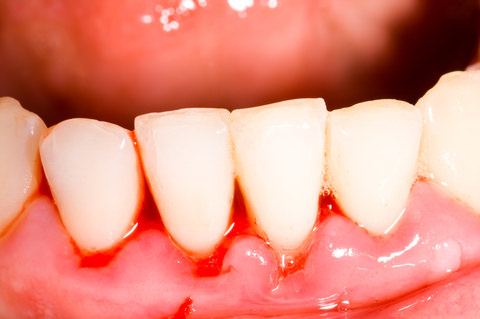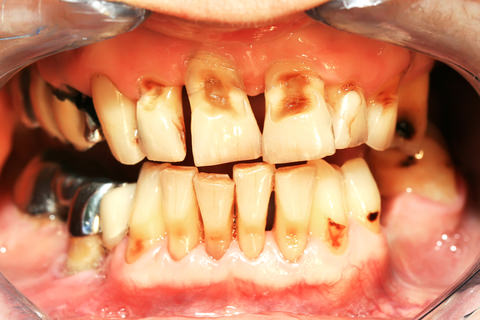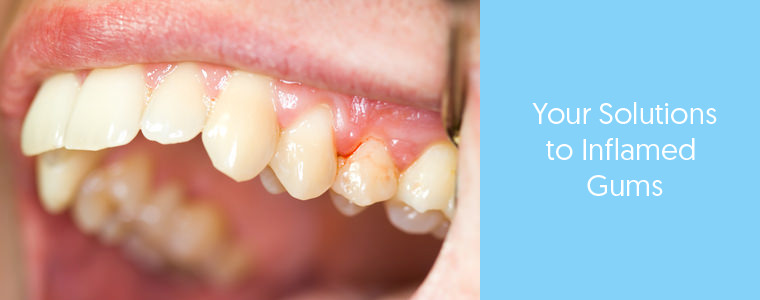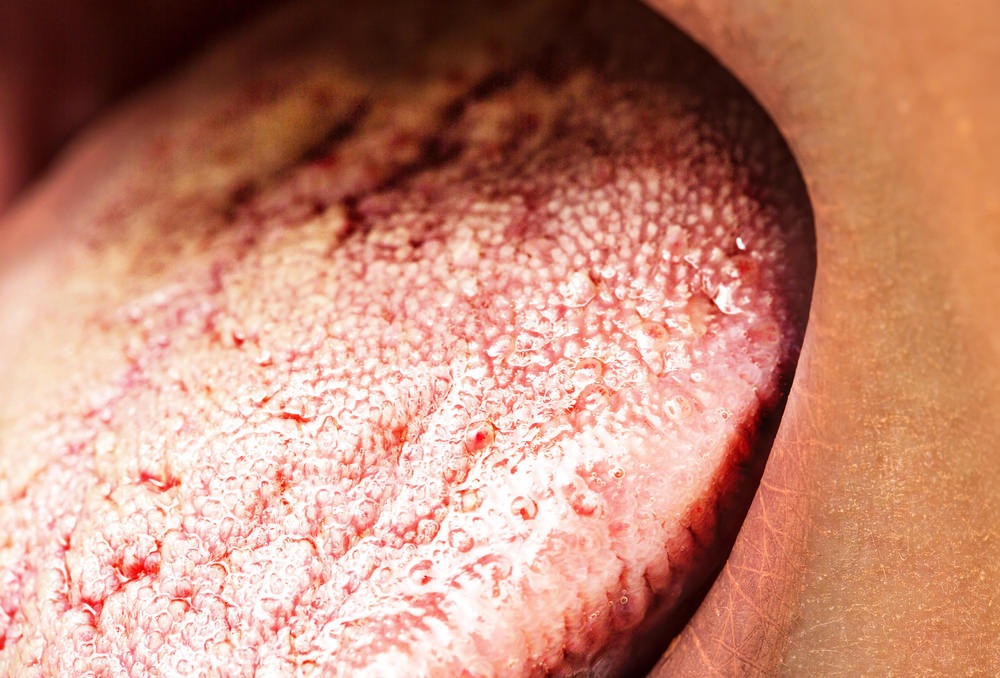What to Do if You Have Inflamed Gums?
Inflamed gums are a common problem, with a number of different causes.
So, what are they, and how, when and where do you fix them?
Inflamed gums often go unnoticeable, as the inflammation may not be painful.
However, it is important to catch them early, so they do not proceed from gingivitis to periodontitis.
This way, you can reverse and heal the inflammation from home in a simple, routine manner.
Keeping up a strict oral hygiene regime, a healthy, balanced, nutritious diet, and consulting your dentist when necessary will stop you from needing any further treatment in the dental chair.
Let’s find out just how and when gum inflammation can be treated in the comfort of your own home.
What do Inflamed Gums Look Like?
Usually resulting from a build-up of plaque and tartar on your teeth and gums, inflamed gums are a common problem in adults.
If caught early, they may not proceed any further from red, swollen and tender gums.

Gingivitis – Bleeding gums and plaque build up
If the infection does get worse, depending on the severity of the inflammation, you may find yourself suffering from one of two types of gum disease:
Gingivitis
The earliest and still mild state of gum disease, gingivitis is the most common form of inflamed gums.
It is a bacterial infection of the tissues around your teeth, which has been caused by a build-up of plaque.
It is relatively pain-free, so you may not know that you have it.
The most common symptoms of gingivitis are gums that are red, tender, swollen and bleed when you brush or floss. You may also have bad breath.
Whilst not too serious, it is important you treat the disease before it worsens.

Severe periodontitis – Loss of tooth structure and gum deterioration
Periodontitis
If you do not tend to your gingivitis in a timely fashion, it can worsen to a more advanced type of gum disease called periodontitis.
Your gums will become more painful, and your teeth may even start becoming loose, as the tissue that holds your teeth in place is becoming damaged.
Treatment of inflamed gums at this stage is very important for your oral health, as periodontitis is a major cause of tooth loss in adults.
Symptoms include bleeding, swollen gums, constant bad breath or a bad taste in your mouth, loose teeth and a change in how your teeth fit together when you bite (known as malocclusion).
You may even notice that your teeth appear to look longer, as your gums and bones begin to recede.
Why do my Gums Get Inflamed?
Inflamed gums are most often the result of poor oral hygiene.
Not brushing and flossing your teeth on a regular basis will allow plaque to build upon your gum line and teeth.

Brushing your teeth – It will reduce the chance of inflamed gums
Plaque is a thin film of bacteria and food particles that constantly forms on the surface of your teeth. Once the plaque remains on the teeth for more than a few days, it becomes something called tartar.
Tartar is hardened plaque – something that normally cannot be removed with brushing and flossing.
A build-up of tartar can lead to gingivitis or inflamed gums.
How Can You Treat Inflamed Gums at Home?
If suffering from gingivitis (early gum disease), the inflamed gums should be treated at home as soon as possible.
Follow the below simple steps to get your mouth back in a good health condition;
Improve your Oral Health Regime
Perfect your teeth and gum brushing technique by brushing less forcefully, instead of using gentle, circular motions.
This will avoid causing further damage to the tissue around your teeth, which will tend to inflame your gums.
Purchasing a new toothbrush with soft, nylon bristles that have blunted ends may also be a wise investment.
Floss Meticulously
Flossing removes all the particles of food that remain stuck between your teeth, which can cause plaque and tartar build-up.
Without flossing, these leftover particles can lead to gum disease and inflamed gums.
Take care when flossing – as with brushing, be gentle. Carefully slide the floss up and down, following the curve of each tooth.
Rinse Your Mouth Regularly
Rinsing your mouth is another way of removing food particles and debris that can cause plaque, which can cause inflamed gums.
Try rinsing with a saltwater solution after every meal to rid your mouth of bacteria.
Improve Your Diet
Eating a well-balanced diet, especially one full of nutrition, can result in healthier gums.
Also ensure you get plenty of Vitamin C and calcium, which can reduce the risk of inflamed gums.
Drink Lots of Water
This will help stimulate the production of saliva.
The presence of saliva weakens any disease-causing bacteria in the mouth.
Avoid Irritants
Try to avoid things that could cause additional irritation to your gums.
This includes strong mouthwashes, alcohol and cigarettes.
Use Warm and Cold Compresses
Using a warm compress on your face can help relieve gum pain.
Using cold compresses can help reduce swelling.
Stress Less!
High levels of stress can have a negative impact on your hormone levels, in particular, the hormone cortisol.
Cortisol can lead to inflammation and swelling of the gums.
The answer?
Stress less!
Of course, it certainly doesn’t hurt to visit your dentist for treatment recommendations and perhaps a professional clean.
Your dentist will be able to locate the exact cause of the inflammation, and in turn, help you get better gum health.
14 Most Common Causes of Inflamed Gums
- Poor oral hygiene routine – i.e. irregular or improper brushing or flossing
- Smoking or chewing tobacco
- Chemotherapy
- Hormone changes
- Irritation from dental appliances
- Genetic factors
- Pregnancy
- Diabetes
- Certain medications, including steroids, some anti-epileptic drugs, cancer therapy drugs, some calcium channel blockers and oral contraceptives
- Malnutrition
- Infection i.e. herpes, thrush or dental decay
- Dry mouth
- Crooked teeth
- Broken fillings
What are the Most Common Treatments?
If your gums have been swollen for longer than two weeks, it’s time to consult your dentist.
You will be asked questions about your medical history, including when you noticed the symptoms of the inflammation begin, and how often they arise, whether you are pregnant, and whether you have recently made any changes to your diet.
Your gums will be probed with a small ruler – this is to check for inflammation.
Full mouth dental x-rays may be needed, to check for bone loss, as well as blood tests to check for an infection.
If you have a mild case of swollen gums, you may be prescribed antiseptic mouthwash (containing chlorhexidine) to help prevent gingivitis and reduce plaque.
You may also be given recommendations for a specific brand of toothpaste that will work better. In some cases, oral antibiotics may also be necessary.
If you have a severe case of gingivitis, surgery may be required. One of the most common treatment options is called scaling and root planing.
In this procedure, your dentist will scrape away the diseased gums, dental plaque and tartar on the roots, which will allow what is remaining of the gums to heal.
Another option you may be presented with is a laser, which may remove tartar with less pain and bleeding than scaling and root planing.
Bone and tissue grafts can also be used when teeth are damaged to heal them.
Can You Stop Inflamed Gums for Life?
If you intercept your case of inflamed gums early, it can be reversed and healed provided you follow a proper dental hygiene routine.
If you do not follow proper dental hygiene, the bacteria in your mouth forms the plaque on your teeth, which causes your gums to become inflamed.
Left untreated, this can worsen, and ultimately lead to tooth loss.
But with the right dedication, oral hygiene, and a balanced diet, you can typically reverse mild to moderate cases of inflammation within two weeks.
Conclusion
If you notice inflamed gums early, they can be reversed and healed in the comfort of your own home by practising good oral hygiene, along with a good diet.
However, left untreated, inflamed gums can lead to cases of gingivitis, periodontitis and eventually even tooth loss.
Be sure to consult your dentist if you notice symptoms of red, tender, swollen or loose teeth that bleed when you brush or floss, bad breath or a bad taste in your mouth, or loose teeth, especially if any of these symptoms last for longer than two weeks.
Leaving it alone in the hope that it may heal itself may not be worth the risk as you may find yourself losing a tooth – and that is nothing worth smiling about!
By Dr. V
Created at May 02, 2019, Updated at January 25, 2025





